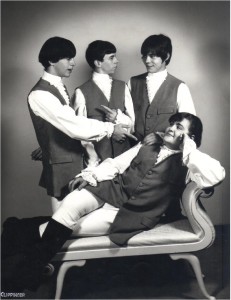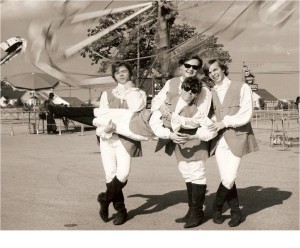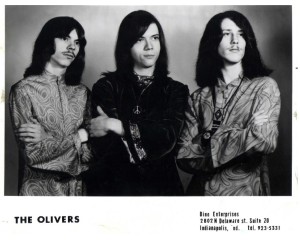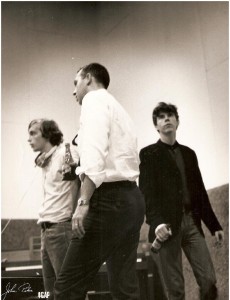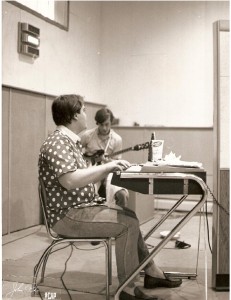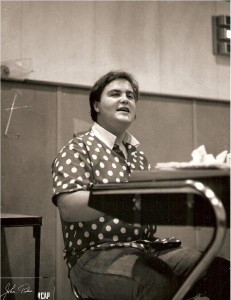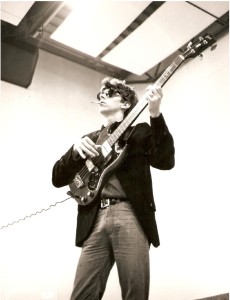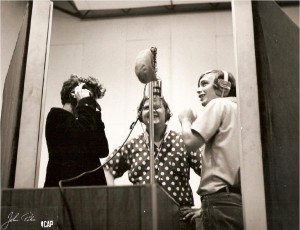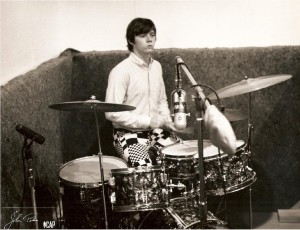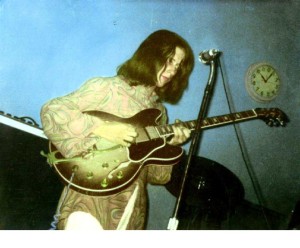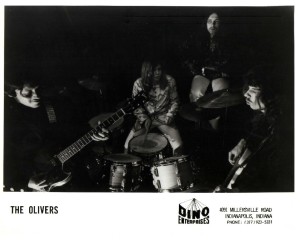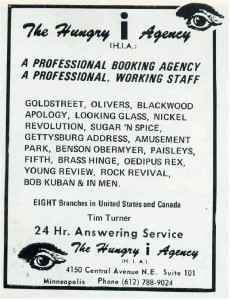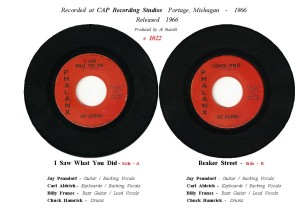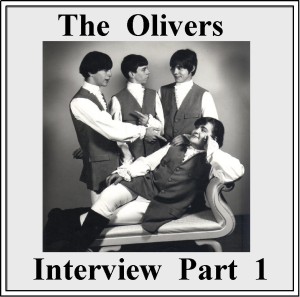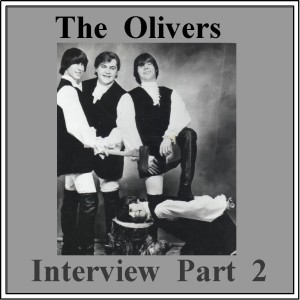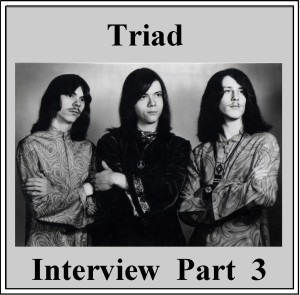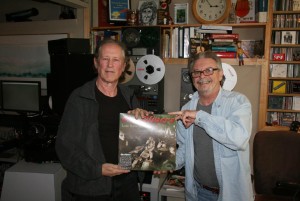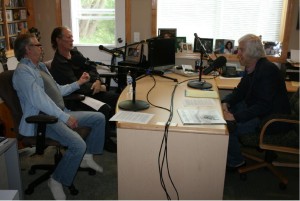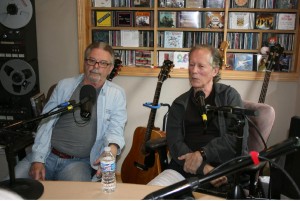Triad (and The Olivers)
The Olivers from Fort Wayne, Indiana relocate to Minnesota and become Triad
Contents:
History
Triad (and The Olivers)
1960 – 1962: In Fort Wayne, Indiana, 12 year old guitar player Mike Mankey gets together with guitar player Billy Franze (also 12 years old) and the two start playing music together and eventually locate a bass guitar player and drummer and put a band together called The Shadows. The lineup for the new band is: Mike Mankey on guitar and vocals; Billy Franze on guitar and vocals; Jerry Vachon on bass guitar; and Bob Goodwin on drums. The group practices once a week in Mike’s bedroom. After a year or so, the band decides to increase the practices to two or three times a week. The band learns to play R & B songs from late 1950’s and early 1960’s as well as popular songs on the radio.
Mid, 1963: The Shadows play their first public job, at the Rec Center at Bloomingdale School (a grade school) which is located across the street from Mike’s Home. After this job, the band picks up another venue they play at, Hamilton Park. The band plays on a regular basis between the school and the public park. The band picks up the very first 45’s by The Beatles released in the United States and adds them to the their song list.
Fall, 1963: In Fort Wayne, Indiana, Chuck Hamrick and Jay Penndorf are part of a band called The Serfmen who play mainly surf music. Chuck and Jay want to move into doing their own versions of R & B songs and this causes the band to split up with Chuck and Jay maintaining the band name. Two new members join the group, Carl Aldrich on keyboards and vocals and Greg Church on bass guitar join Jay Penndorf on guitar and vocals and Chuck Hamrick on drums.
1964: The band records a 45 with “A Man Can’t Live Without Love” backed with “Cry” at a local Fort Wayne radio station WGL, with help from DJ Al Russel and Chuck’s mother, Mary Jane Hamrick, who paid for the pressing of the records. The band’s first 45 becomes a local and regional hit, and helps the group gain in popularity and obtain more jobs. Later in 1964 a second 45 is recorded and released with “(I Want You) Back Again” and “Chills and Fever” (a cover of a Ronnie Love song from 1961) and is also a local and regional hit. Both records are pressed on the band’s own Nemfres label, which is Serfmen spelled backwards. The Shadows discover there are numerous other bands called The Shadows so they have a name change and become The Unexpected. The band decides to cover two of The Serfmen’s songs: “Cry” and “(I Want You) Back Again.” The success of the two 45’s brings the band numerous jobs at popular venues throughout Northern Indiana and Northwestern Ohio.
1965: Dino Enterprises, a booking agency based in Indiana takes notice of the band and signs them to a booking contract.
Fall, 1965: The Shadows decide there are too many other bands with the same name and want a more unique name so Mike comes up with a new name, The Unexpected. The Serfmen hear that The Unexpected are covering two of their songs and decide to go see the band play live at Hamilton Park. The Serfmen are impressed with the band and in particular take notice of Billy Franze and his vocals on the R & B songs. Greg Church leaves The Serfmen because they are traveling too much for him and the band looks for a new bass player. Billy Franze finds out the band is looking for a new bass player and when he runs into two of the band members at a local record store. Billy informs them that although he is currently playing guitar he can also play bass guitar and would be interested in joining their band. Billy gets the job with The Serfmen and the new lineup is: Carl Aldrich on keyboards and vocals; Jay Penndorf on guitar and vocals; Billy Franze on bass guitar and vocals, and Chuck Hamrick on drums.
At this time the band decides it is time for an image change and a name change (with encouragement from Dino Enterprises) as the United States is now entering the second year of the British Invasion. The band members switch to “19th Century English” style stage outfits, let their hair grow longer, and become The Olivers… borrowing the name from Oliver Street located on the South side of Fort Wayne.
After Billy left The Unexpected to join the Serfmen, Jerry Vachon leaves The Unexpected to join The Schillings. Jerry’s brother Dick Vachon plays drums and sings for the band. This brings The Unexpected to an end. Mike Mankey also plays with The Schillings for about one month.
Early, 1966: Al Russel gets The Olivers connected with CAP, a recording studio in Portage, Michigan where the band records “I Saw What You Did” and “Beeker Street.” Both songs are written by Carl and Jay. The 45 is released on the Phalanx label and gets airplay on WGL and WOWO in Fort Wayne. The record is pressed with a typo in it and states “Beaker Street” in error.
September, 1966: Jay Pendorf is drafted into the military service. Billy Franze contacts Mike Mankey and offers him a job with The Olivers and Mike accepts the offer. The new lineup is now: Carl Aldrich on keyboards and vocals; Mike Mankey on guitar and vocals; Billy Franze on bass guitar and vocals, and Chuck Hamrick on drums.
Early, 1967: With the help of Dino Enterprises and Mary Jane Hamrick, the record is eventually picked up by RCA Records in New York. RCA corrects the spelling of “Beeker Street” and mark it as the “plug side.” Being signed to RCA helps the band get more jobs, however RCA presses up the 45 but fails to promote and distribute the 45 and the record does not hit the national charts.
Carl Aldrich leaves the band due to artistic differences with the other band members and Rick Durrett joins the band on keyboards. Rick had played with a band called Cardboard Bachs from Tennessee. The new lineup is now: Rick Durrett on keyboards; Mike Mankey on guitar and vocals; Billy Franze on bass guitar and vocals, and Chuck Hamrick on drums.
The Olivers tour the Midwest including Minnesota. The Olivers open up shows for a number of big name acts including: The Rolling Stones; The Hollies; The Yardbirds; The Byrds; The Standells; Bob Seger; The Who; Blue Cheer; and Jefferson Airplane.
September, 1968: Jay Pendorf returns to the band after finishing his two years in the military service. The new lineup is now: Rick Durrett on keyboards; Mike Mankey on guitar and vocals; Jay Pendorf on guitar and vocals; Billy Franze on bass guitar and vocals; and Chuck Hamrick on drums. The band makes a change in their stage clothes at this time and wear the latest in Psychedelic attire.
Winter, 1969: The Olivers record an album of original songs at Dove Recording Studio in Bloomington, Minnesota, produced by Pete Steinberg. The band spends about one week at Dove doing the recording in the evening hours. A “rough mix” of the album (seven songs) is completed. The songs are all original and in the Progressive – Psychedelic style of the times. Mike is playing a Gibson SG Standard with a fuzz tone pedal and a wah wah pedal. Jay is playing an Epihone, also with a fuzz tone pedal and a wah wah pedal. Rick is playing a Hammond B3 with one Leslie Amp (L-100 model) and also uses a Baldwin Harpsichord with a Baldwin Amp. Rick used two Leslie Amps playing live. Pete Steinberg has connections with Sire Records in New York who express an interest in putting out the album on their label and band photos for the album are taken and liner notes are written up.
The songs recorded for the album are as follows:
- “Ball of Fire” (Billy Franze)
- “Mushroom” (Jay Penndorf)
- “Jessica Ryder” (Billy Franze)
- “Someday Somewhere” (Billy Franze)
- “The End” (Rick Durrett)
- “Free” (Mike Mankey)
- “Social Slavery” (Mike Mankey)
The planned album never comes out on Sire and is never released on any label. The band members return to Fort Wayne, Indiana, with no tapes and no acetates of their Dove recordings sessions. Jay and Rick leave the band and Billy, Mike, and Chuck carry on as a three piece band and come up with a new band name: Triad. Since the band still has bookings under The Olivers, they play these jobs as The Olivers. Chuck is forced to leave the band due to health issues and Kent Cretors is hired to take over on drums. The group members had observed Kent playing in a prior band and were impressed with his “Keith Moon” (from The Who) style of drumming.
May, 1970: Billy Franze, Mike Mankey; and Kent Cretors decide to relocate to Minneapolis and use the new band name: Triad. The three musicians move into a house with members of The Nickel Revolution located on 2nd Avenue Southeast near The Labor Temple, a venue that holds rock concerts on Sunday nights, booked and promoted by David Anthony Wachter.
The band plays often, booking their own jobs until they sign a deal with Hungry Eye Agency and are then booked by Tim Turner (one of the owners of the booking agency). In addition to Nickel Revolution, the group gets to know other local rock bands including The Litter, White Lightning, Crow, and Cain.
The band plays at local clubs including Magoo’s; New City Opera House; Time’s Square; and the Labor Temple in Minneapolis; and Casino Royale in Fridley. At New City Opera House the band opens up for Santana. At the Labor Temple the band opens up for The Serf’s. Triad also plays at the outdoor “Love In” concerts held at the Flying Cloud observation point in Eden Prairie on the Minnesota River Bluff.
The band plays the following original songs:
“The Only Way to Fly” (Billy Franze)
“Borderline” (Billy Franze)
“Someday Somewhere” (Billy Franze)
“Ball of Fire” (Billy Franze)
“Hear the Wind Blowin’” (Mike Mankey and Billy Franze)
The band plays the following cover songs (in their own progressive/psychedelic style) by the following bands:
“I Feel Good” (James Brown”
“Try a Little Tenderness” (Three Dog Night)
“She’s a Woman” (The Beatles)
“Happenings Ten Years Tine Ago” (The Yardbirds)
The Yardbird’s song “Happenings” was typically the last song of the band’s live shows and was a twenty minute “extended” version of the song which included excerpts from the following songs:
“Satisfaction” (Rolling Stones)
“Snake Alla Gris-Gris” (Dr. John)
“My Eyes Have Seen You” (The Doors)
“Fly Jefferson Airplane” (Donovan)
Triad plays live with a small arsenal of Vox equipment including four Super Beatle Amps with eight Vox Sovereign speakers (each Sovereign has four Oxford Gold Bulldog speakers). The group also uses a Vox Churchill PA Amplifier with a Vox Winston PA system. The Vox gear blasts out sound waves at over 100 decibels. Kent Cretors plays Ludwig (Red Pearl) drums.
The band travels to Winnipeg, Canada for two weeks to record and play jobs. The band records two songs written by Billy Franze at Franklin Records in Winnipeg: “The Only Way to Fly” and “Borderline” which is released on Franklin Records, run by Frank Winer, who is also an owner of Hungry Eye, which has an office in Winnipeg. The two songs are more in a mellow light rock style compared to the album recorded at Dove. Billy sings both songs and also plays piano on the B-side. The record is played in Canada, but not in the United States.
1971: Local photographer Mike Barich takes a photo of the band playing live at Time’s Square in downtown Minneapolis and the photo is published in Connie’s Insider, a local music magazine. Time’s Square (formerly the Friar’s Supper Club) is owned by local musician Danny Stevens.
Billy accepts an offer to join another band. Kent decides to go back and join the family business in Ohio. Mike joins a local progressive rock band called Thundertree who have recorded an album that has been released on the national Roulette record company. Triad comes to an end.
UPDATE:
For decades former band members of The Olivers wondered what happened to their tape or acetate of their recording sessions at Dove from 1969. Pete Steinberg informed the band that he had no tapes and no acetates from the sessions. Dove closed down in 1970, one year after the recording sessions. The band members assumed that the recordings of their sessions were lost forever. But the story of The Olivers was not yet over and a series of highly unpredictable events would take place decades after the 1969 recording sessions at Dove Studio in Bloomington that no one in the band could have possibly foreseen… events that would seem to border on the unbelievable.
On July 11, 2011, a fan and historian of Indiana rock bands from the 1960’s, Tim Cox received an alert on Ebay that a new item was up for auction with the name – The Olivers. Tim Cox had already acquired the Phalanx 45 and the RCA 45 and had never removed the Ebay alert for The Olivers. A seller from Hollywood, California had listed an acetate for sale on the GRT, a subsidiary of Columbia Records. The acetate listed The Olivers on Side 1 and Side 2. No dates were listed and no songs were listed. On the Ebay listing was a sound clip with brief sections of four songs on the acetate. Tim Cox had been in touch with Jay Penndorf and Mike Mankey for many years and forwarded them the sound clip. Jay and Mike verified that the songs were from the 1969 sessions at Dove in Minnesota. Tim began to bid on the acetate.
At the same time, another 60’s garage band fan and historian, Mike Dugo noticed the acetate was up for sale and he began to bid on the item. Tim Cox and Mike Dugo knew each other through a website on 60’s garage band 45’s. On July 15, 2011 Mike Dugo put in the winning bid on the acetate and shortly thereafter received the disc. Missing for 42 years, the “Lost Dove Sessions” by The Olivers (against all odds) had at long last been found.
Mike Dugo had connections with a record company in Germany that released obscure Progressive – Psychedelic 1960’s bands from the Unites States. The acetate acquired by Mike Dugo was used to master a new vinyl album and a new CD that included The Olivers entire unreleased album, plus the two 45’s by The Serfmen and also the 45 recorded by Triad. The vinyl album was released on September 15, 2012 and the CD was released in October, 2012 by Break-A-Way Records based in Germany. The record company also re-released The Oliver’s 45 of “I Saw What You Did” and “Beeker Street” recorded in 1966 complete with the original picture sleeve showing a photo of the band members.
Some people may have thought the song “Beeker Street” was a reference to an underground radio program called “Beaker Street” that was broadcast on KAAY, an AM station out of Little Rock, Arkansas from 1966 through 1977 and hosted by Clyde Clifford (real name Dale Seidenschwarz). The radio show pre-dated the FM stations of the 1970’s that featured underground music and the 50,000 clear channel station reached small towns across the Midwest with alternative music that they likely had no other access to. However, the band members have stated that the song had no connection with the underground radio show.
On April 23, 2015 Jay Pendorf reported the following: “Beeker Street” came when Carl and I wrote lyrics at Carl’s house. It was a rainy night in November.” After Carl heard the guitar riff from the beginning he suggested to Jay that they write a song about a broken relationship and the guy decides to go to “Beeker Street” where the guy would forget about the girl or hopefully she would go there too because she was equally upset. Jay: “The street would be shadowy, foggy, and dark like the street where Jack the Ripper worked in Whitechapel, London, England. We thought the street name there was Beeker Street. We didn’t know for sure, but it sounded good so we used it. The naming had nothing to do with the radio show, which I understand was pretty good. We did “I Saw What You Did” the same night.”
The Oliver’s 45 of “I Saw What You Did” backed with “Beaker Street” on the Phalanx label has become a highly sought after item by record collectors, as well as the RCA 45 of the two songs. Music journalists (and record collectors) have used the term “Monster 45” when referring to the record, meaning it is now considered one of the very best 45’s from the 1960’s in the progressive – garage rock genre.
On September 19, 2015 Mike Mankey reported the following about his song “Social Slavery”: “When I wrote Social Slavery it was mainly about not being just like others to be accepted. The music came after the lyrics. It all started from three chords and evolved to what was recorded. I had always hoped to be able to write songs that were a little bit different.”
Written by Tom Campbell
Version 1: April 18, 2015
Version 2: April 21, 2015
Version 3: April 22, 2015
Version 4: May 14, 2015
Version 5: July 15, 2015
Version 6: August 16, 2015
Version 7: September 6, 2015
Copyright by Thomas R. Campbell, 2015
The Olivers “Lost Dove Sessions” (Album Review)
The “Lost Dove Sessions” consist of seven songs recorded by The Olivers in 1969 at Dove Recording Studio in Bloomington, Minnesota. Pete Steinberg was the engineer and producer for the sessions. After the recording sessions, The Olivers returned to their hometown of Fort Wayne, Indiana, without any tape recording or acetate of the sessions. The band was under the impression that Pete Steinberg had secured a recording deal with Sire Records out of New York, however this was not the case. With the “against all odds” discovery of the only recording of the sessions in 2011, a rough mix of the songs on an acetate, the album was finally released by Break-A-Way Records out of Germany in 2012.
Playing on the songs are: Billy Franze on bass guitar and lead vocals; Mike Mankey on guitar and backing vocals; Jay Penndorf on guitar and backing vocals; Rick Durrett on Keyboards; and Chuck Hamrick on drums. The sessions were done over the course of a week at Dove in the early part of 1969 including a “rough mix” completed in four hours. The Olivers had reached a lofty position in the ranking of the Fort Wayne, Indiana bands, built on the foundation of The Serfmen who started out in 1963 and worked their way up to the top of the ladder of popular Indiana bands. In 1965 The Serfmen transitioned into The Olivers with a brand new look and a more progressive rock sound. By 1969, the band had been influenced by Jimi Hendrix, Led Zeppelin, and Cream, among other hard rock/progressive/psychedelic bands from the later 1960’s.
Song 1: “Ball of Fire” (Billy Franze). This is probably the most “commercial” sounding song on the album, a basic rock’n’roller with a hypnotic bass guitar riff that moves the song along at a good clip. When Billy sings: “Got me going and I can’t stop now. Gotta get ahold of myself somehow. Give me a lesson and show me how” you cannot stop yourself from cranking up the volume to the maximum level.
Song 2. “Mushroom” (Jay Penndorf). This is a bizarre song where the singer is having a dream about being in a nice pastoral setting with green grass and flowers on a sunny day that is suddenly interrupted by a strange sight: “When all at once out of nowhere came this giant mushroom.” Then there is a frightening discovery: “As it rose, a scarlet rose wilted in my hand. Then I knew it must be true, the mushroom was made by a man” which means a mushroom cloud generated by a nuclear explosion. But wait, the dream gets even worse. The singer hears a voice (from the mushroom I guess) that says: “You made me to protect yourself, now I seal your doom.” Yikes! That would certainly be enough to mess up anyone trying to get a good nights sleep.
Song 3. “Jessica Ryder” (Billy Franze). This is a long, slower paced rock song with a folksy feel to it, a tribute to a fictional girl: “And when I sit down beside her, she reaches out and takes my hand, made me feel like a man.” The song clocks in at 9:23 and features grinding organ parts, clever harpsichord overdubs, and extended psychedelic guitar riffs from Mike and Jay.
Song 4. “Someday Somewhere” (Billy Franze). This a very moody and very intense love song, with Billy singing in his most raspy, tortured, heartfelt voice: “Someday somewhere I might find a rainbow and at the end a pot of gold. Money buys itself a lot of people, but never will it warm your heart when the night is cold. And what good would it do me when I am alone. Listen to me when I say I need you.” This is a nice ballad, packed full with emotion (if you are the sensitive type, this could bring a tear to your eye), with a simple arrangement (guitars and bass guitar, no drums) to balance out the hard rock’n’roll.
Song 5. “The End” (Rick Durrett). This is the most dark, mysterious, and haunting song on the album which is all about making the final exit from this planet: “It’s getting so much darker. My thoughts are not so clear. Angels bid me welcome. The end is getting near. How far must I go, how long will it take. How much will I know, when it’s all over, when it’s all over. As long as the North wind blows, as long as the candle goes, more than anyone that knows, it’s nearly over, it’s nearly over.” There is even a “spooky” talking part in the song: “And as I pass through the golden door, I see what I’ve been living for…” Makes one think, for sure.
Song 6. “Free” (Mike Mankey). This is a laid back song about being yourself: “Answer me one question, where do I go if I don’t belong” sings Mr. Franze, who has a very simple wish: “I just wanna be free.”
Song 7. “Social Slavery” (Mike Mankey). Mike’s song seems to be about not conforming to the norm and not selling out. The lyrics are a bit cryptic: “Don’t cry, start all yellin’. No, I said we are not going to be sellin’. To social slavery, social slavery. You can take your hat and coat and all go to hell. Don’t you know baby, we’re not going to sell. To social slavery, social slavery. Can’t lie, truth I’m given. Just a little too hard for me to live in. Social slavery, social slavery. Cynic and comedienne, why don’t you go to hell. I don’t care for your opinion, we’re not going to sell. To social slavery, social slavery.“ This song is even longer than “Jessica Ryder” clocking in at 12:19 with a very long instrumental ending with Mike and Jay going all out, playing their most “trippy” psychedelic guitar parts on the album.
It’s a shame this album did not get pressed up on the Candyfloss label out of Dove Recording Studio. If it had gone through the final mix and been released on Candyfloss, this album would now likely be in the “cult” category, similar to C.A. Quintet’s “Trip Thru Hell” album (also recorded at Dove and released on Candyfloss) which now sells in $3,000 to $5,000 price range. Had the band gotten their wish and had the album released on a major label, there is no telling what may have happened. The album would have fit in well with the music that was being played on the underground FM stations in the late 1960’s and into the early 1970’s. Considering the only known recordings of the sessions were missing from 1969 to 2011, to have this rough mix of the album come out on a German label in 2012 is more than a real treat. I would say that “Ball of Fire” and “Jessica Ryder” are the most “commercial” songs on the album and could have been released as 45’s, although “Jessica Ryder” would have had to have been edited down to a three or four minute song. Mike, Billy, Jay, Rick, and Chuck “found the groove” during these sessions. The songs are tight, well rehearsed and loaded with that illusive energy that every rock band strives for. Unfortunately the music business was not (and is not) kind to most local bands who try to go national. More things seem to go wrong than right for the vast majority of local bands and this certainly appears to have been the case for The Olivers. Despite the lack of a final mix, this is still a great album and puts The Olivers in the history books with one of the best progressive/psychedelic recordings from the late 1960’s.
Written by Tom Campbell
September 13, 2015
Revised May 20, 2017
Copyright by Thomas R. Campbell, 2015 and 2017
All Rights Reserved
No portion of this web page can be used without permission.
Photos (Click a photo to see it full-screen, then click the arrows to see the next one.)
The Olivers – Early 1966 The Olivers – Late 1966
Promo Photo at Amusement Park Promo Photo – Dino Enterprises
CAP Recording Studio: The “Beeker Street” Sessions 1966
Later Photos of The Band
Billy Franze Chuck Hamrick
Mike Mankey Promo Photo used for Album Cover
Recordings
I Saw What You Did – Side A
Beeker Street – Side B
The Olivers – Beeker Street – The Complete Recordings –
1964 – 71 Break-A-Way Records Germany 2012
Ball of Fire
Mushroom
Jessica Ryder
Someday Somewhere
The End
Free
Social Slavery
The Only Way To Fly (Triad)
Borderline (Triad)
Bandtree
_______________________________________________________
Billy Franze Guitar / Bass Guitar / Vocals 1965 to 1971
The Shadows / The Unexpected (Fort Wayne, Indiana)
The Olivers (Fort Wayne, Indiana)
Triad
Danny’s Reasons
Doctor Mambo’s Combo
Jobbing
_______________________________________________________
Mike Mankey Guitar / Vocals 1966 to 1971
The Shadows / The Unexpected (Fort Wayne, Indiana)
The Olivers (Fort Wayne, Indiana)
Triad
Thundertree
Solo Artist
_______________________________________________________
Chuck Hamrick Drums 1965 to 1969
The Serfmen (Fort Wayne, Indiana)
The Olivers (Fort Wayne, Indiana)
________________________________________________________
Rick Durrett Keyboards 1967 to 1969
Cardboard Bachs (Tennessee)
The Olivers (Fort Wayne, Indiana)
Pacific Gas and Electric (California)
Coven (Chicago, Illinois)
_______________________________________________________
Kent Cretors Drums 1969 to 1971
The Olivers (Fort Wayne, Indiana)
Triad
________________________________________________________
Jay Penndorf Guitar / Vocals 1965 to 1966 and 1968 to 1969
The Serfmen (Fort Wayne, Indiana)
The Olivers (Fort Wayne, Indiana)
________________________________________________________
Carl Aldrich Keyboards / Vocals 1964 to 1967
The Serfmen (Fort Wayne, Indiana)
The Olivers (Fort Wayne, Indiana)
________________________________________________________
Where are they now?
Billy Franze: Playing in numerous bands, living in Minnesota.
Mike Mankey: Playing as a solo artist, living in Minnesota.
Chuck Hamrick: Retired, living in Atlanta, Georgia.
Rick Durrett: Playing live music, living in Nashville, Tennessee.
Kent Cretors: Working in a family business in Ohio.
Jay Penndorf: Playing his guitar every day, retired, living in Indiana.
Carl Aldrich: Writing songs, living in Indiana.
________________________________________________________
Interview
Interview PART ONE – Time = 20:16
Interview Part TWO – Time = 20:30
Interview Part THREE – Time = 21:38
Interview Part FOUR – Time = 17:44
Mike and Billy with Oliver’s Album Billy and Mike with Tom at the interview
Billy and Mike at the microphones Billy and Mike at studio on May 31, 2015

